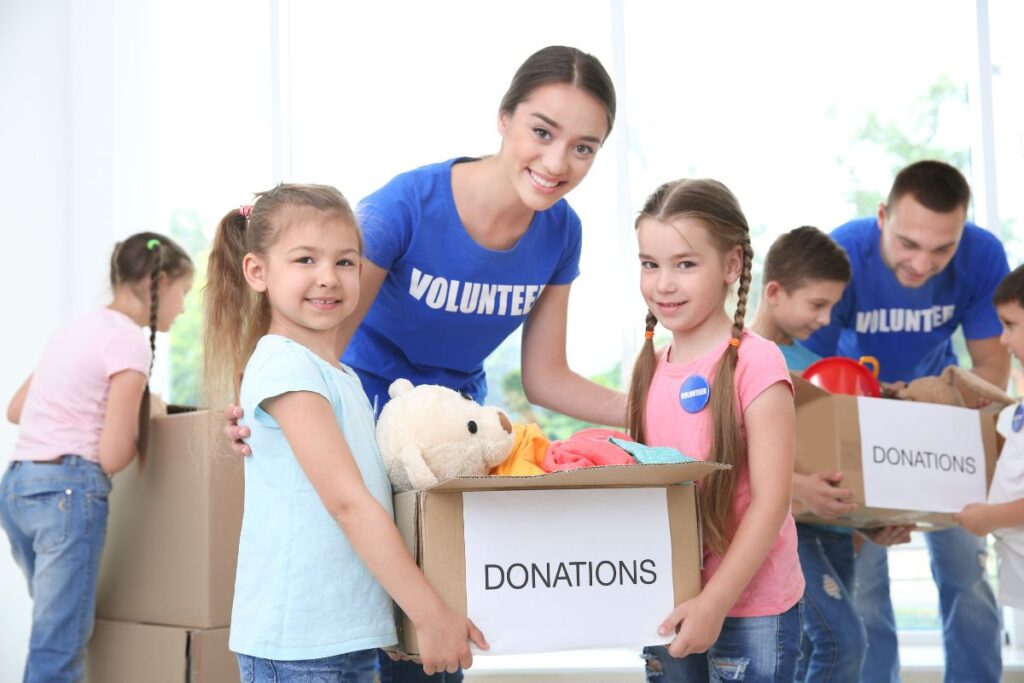Inside: Use these tips for teaching minimalism to your kids starting with leading by example.
A guest post by Cora Gold
Minimalism is the practice of focusing on the true importance of things in your life. If you’re a parent, your family is a top priority. However, sometimes the stresses of life can become a distracion from that.
As you work through your own journey to minimize and enjoy the benefits of living with less, it’s natural to want to teach that to your kids.
In some ways, minimalism can be challenging when you have children. Most parents have experienced tripping over (too many) toys in a cluttered home. But that doesn’t mean that it’s impossible.
If you set a good example for your children, you can teach your kids to practice minimalism and lead a happy, intentional life while focusing on the things that matter most.
Reasons for Teaching Minimalism to Kids

Less Is More
The mentality of valuing what you have rather than hyper-focusing on things you want teaches children gratitude and grace. Material possessions may bring temporary happiness, but they aren’t fulfilling on a grander scale.
Often, children are more likely to enjoy playing with pots and pans from the cupboard than with their expensive dollhouse. So, why must we fill their room with toys they may or may not play with?
Having less teaches children to use their imaginations more. Naturally, you are still going to treat your children with toys. Minimalism just means purchasing with more intention.
Pay closer attention when buying items by asking yourself how often they will play with the toys and if the money is well-spent. Could you buy something they would love and play with just as inexpensively?
Consider toys that promote creativity and imagination and last the test of time rather than simply buying what’s popular.
By limiting the purchases we make and explaining why we make them, children can learn the value of money and budgeting. Saving for items can teach them to spend wisely and prepare for what they want the most.

Promote Healthy Moderation
Find ways to encourage your kids to live simply in healthy ways. For people with addictive personalities it can be very challenging to learn how to live minimally and intentionally.
An addictive personality can lead people to excessive shopping, gambling, comfort eating and other behaviors that contradict minimalism.
Children can easily become addicted to video games, television and social media. They might lose sight of what’s really important in life and become focused on keeping up with the latest trends.
While you don’t need to cut them off entirely from these technologies, you should encourage moderation by limiting screen time. That shouldn’t apply to just them either.
Act as an example for them. If they see you watching television all day or using your phone at the dinner table, they will learn that that’s acceptable. Instead, turn your own electronics off and engage with them in a healthier activity.

Give Back to Society
Teach your children minimalism in other aspects of their lives, like how important it is to give back. Create donation stations in your home for them to add personal belongings when they no longer desire them.
Teach them how to let go of items that no longer bring them joy. When they have outgrown their clothing or the style doesn’t suit them, they can give them to people who will use them.
Many charities within churches and shelters happily take donations and distribute them to people in need.
Teaching your children how to spend money wisely and contribute to a good cause are excellent ways to prepare them for minimalism. This goes back to purchasing with intention.

Benefits of Minimalism
When you declutter your space, you may notice how positively it affects your mental state. Decluttering your home can declutter your mind and improve your overall well-being.
When you are in a cluttered environment, you feel like you’re in a vicious cycle of an endless task list. Your brain signals that there is always something else that needs to be done and is constantly trying to check things off your to-do list.
When you live in a clutter-free area, your brain feels like it can finally relax. Your mind can be at ease because it is no longer overstimulated by the number of things it feels like it needs to be doing.
When your senses are overworking on unimportant things, it can lead to a significant amount of stress.
Clutter is also a distraction that can take our focus away from necessary tasks that require our attention. Clutter can also limit our productivity and repress our creativity, causing us to not operate at our full potential.

How to Teach Minimalism to Kids
Once you’ve discovered all of the benefits of living more simply, it’s natural to begin teaching minimalism to your kids.
Lead by Example
Decluttering is an act of minimalism and helps reduce stress and live a more fulfilling life. Teach your kids how to declutter their lives by focusing on decluttering yours first.
Lead by example and share why you’re decluttering your home and life.
Discuss the benefits of sorting through your possessions and not keeping what you no longer need. Teach them that getting rid of things that no longer bring them joy makes room for something they might need more.
Old toys that may no longer provide satisfaction for them may make a child in need very happy.
Include Them in the Process
After decluttering your things and common areas in the home, work with your kids to help them declutter their things.
Involve them in each step of the process. Let them decide which items they want to keep and which they’re ready to let go of.
Have them be a part of dropping off the donations or giving them to a family member or someone in your local Buy Nothing group. Being involved in the donation process helps kids to feel good about getting rid of items they are no longer using.

Talk About It
Decluttering can bring up a lot of feelings. Talk about what the process is like for you and ask them how they’re feeling too.
Being able to discuss those emotions will help your kids to work through them as they embrace a more minimalist lifestyle.
It’s important to not guilt or shame children for feeling like they want something or because they’re having a hard time letting go.
Engage in conversations around how decluttering can be really hard, but that the end results are worth it. They will be much more likely to want to live more simply when the process is a pleasant one filled with grace, patience, and understanding.
How Minimalism Helps Children
Children can benefit from minimalism in various ways. Teaching them to value experiences over possessions is a life skill that every child can benefit from learning. Teach them the difference between wanting something and needing it.
Children should be encouraged to think of others when deciding if a personal item like a toy is something they can stand to part with. Thinking about children in need who may not get to experience reactions to toys they once loved may help put things in perspective.
Life is much simpler without the distraction of too many things that no longer hold purpose. Being surrounded by stuff that is simply there is distracting and can do more harm than good.
Teaching minimalism to kids allows them to see the joy found in simplicity and how to value what they have rather than what they don’t. Letting go of material possessions can free up time and money to spend on new ventures and opportunities.

Minimalist Lifestyle
Obtaining a minimalist lifestyle can be achieved by diving in headfirst or taking baby steps. Whatever method you choose, you can achieve minimalism by living a more intentional lifestyle.
Be mindful of your purchases teaches kids to live more simply in our consumer-driven culture. Show your children what it means to live a simpler, more sustainable life. Ensure you explain why you choose to live this way and how it can benefit them to do the same.

Cora Gold is the Editor-in-Chief of Revivalist magazine. She loves writing about family and living life to the fullest. Follow Cora on Twitter, Facebook and Pinterest.
Are you teaching minimalism to your kids? Share about it in the comments section.
Sign up on the form below to get weekly decluttering and simplifying inspiration sent straight to your inbox. You’ll also get the free 8 Quick Wins for Decluttering Worksheet to help you start to simplify your life today.

